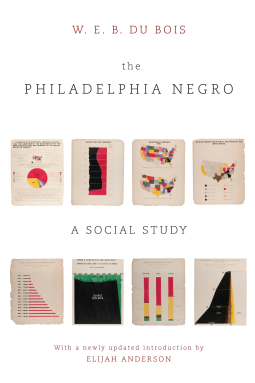
The Philadelphia Negro
A Social Study
by W. E. B. Du Bois
This title was previously available on NetGalley and is now archived.
Send NetGalley books directly to your Kindle or Kindle app
1
To read on a Kindle or Kindle app, please add kindle@netgalley.com as an approved email address to receive files in your Amazon account. Click here for step-by-step instructions.
2
Also find your Kindle email address within your Amazon account, and enter it here.
Pub Date Feb 21 2023 | Archive Date Feb 21 2023
Talking about this book? Use #ThePhiladelphiaNegro #NetGalley. More hashtag tips!
Description
In 1897 the promising young sociologist William Edward Burghardt Du Bois (1868–1963) was given a temporary post as Assistant in Sociology at the University of Pennsylvania in order to conduct a systematic investigation of social conditions in the seventh ward of Philadelphia. The product of those studies was the first great empirical book on the Negro in American society.
More than one hundred years after its original publication by the University of Pennsylvania Press, The Philadelphia Negro remains a classic work. It is the first, and perhaps still the finest, example of engaged sociological scholarship—the kind of work that, in contemplating social reality, helps to change it.
In his introduction, Elijah Anderson examines how the neighborhood studied by Du Bois has changed over the years and compares the status of blacks today with their status when the book was initially published.
Advance Praise
Praise for previous editions
"A century ago, Du Bois published The Philadelphia Negro, a work now recognized as a sociological classic. He developed a highly detailed portrait of black social life in Philadelphia. Part of the legacy of his analysis has lost the theoretical holism which linked structural issues of the economy and labor market dynamics to more social psychological and microsocial issues of prejudice and interpersonal discrimination. Sociology would do well to revisit the model Du Bois established."
—Lawrence D. Bobo, The Annals of the American Academy of Political and Social Science
"What made Du Bois's study remarkable in its day was its rejection of prevailing assumptions of inherent racial differences, thus bearing on issues much wider than those indicated by its title. It is also notable as a thoroughly modern piece of social research. The problems faced by Philadelphia's blacks, he argued, had nothing to do with their supposed racial proclivities, but derived from the way they had been treated in the past and their relegation in the present to the most menial and lowest-paying jobs."
—Times Literary Supplement
Available Editions
| EDITION | Other Format |
| ISBN | 9781512824346 |
| PRICE | $32.95 (USD) |
| PAGES | 568 |
Average rating from 2 members
Featured Reviews
 Carol C, Educator
Carol C, Educator
Now more than ever Americans need to read intelligent research on how black American communities historically dealt with institutionalized forms of racial and economic oppression. Published in the late 1800s, this book is a calm, sober overview of black life in an industrialized northeastern American city during the 19th Century.
WEB DuBois got his doctorate in Germany, and helped organize the first Pan African Congress in 1900, hoping to bring early liberation to Europe’s African colonies. He was only one of many African American scholars to dedicate himself to documenting and uplifting black people internationally in a post-industrial world.
This book offers interesting and needed correlations to contemporary socioeconomic studies of major American cities, especially in 2022, when national elections are looking at statistics on education, crime, employment, and racial justice to decide what new laws and social reforms to implement.
This piece of literature should be required reading for all decolonized social science syllabi and reading lists. Du Bois gives insight on the lives of Negroes living in Philadelphia that is relevant today; his methodology crisp, his analysis insightful. I especially appreciated his description of philanthropy in an unromantic posture: they are called benevolent despots. How apt is that?



